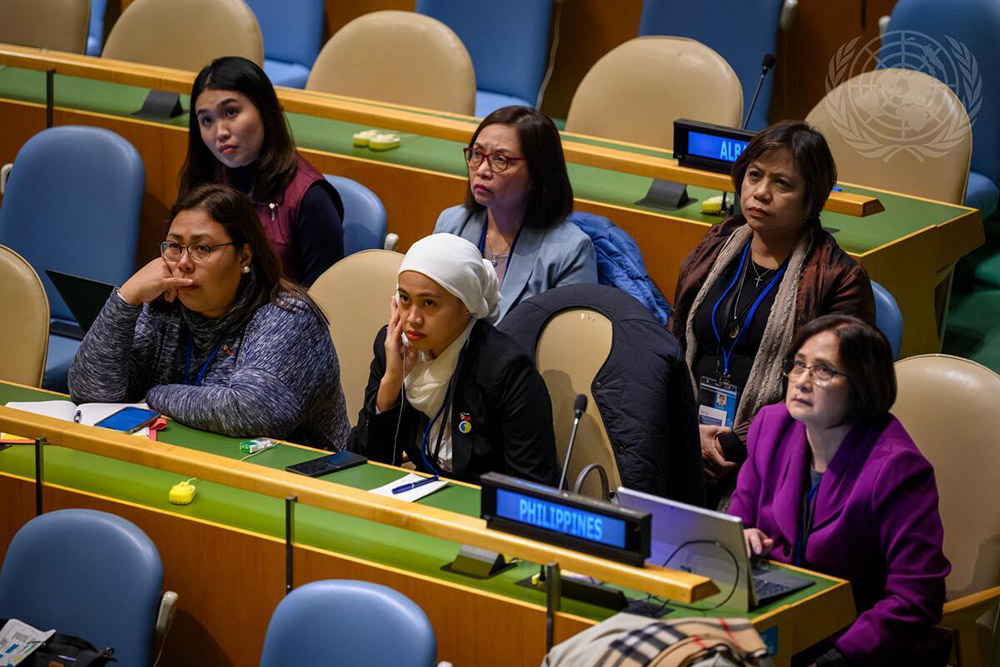
Delegates attend a meeting of the 67th session of the Commission on the Status of Women, held March 6-17 at the United Nations in New York. (UN photo)
In her ministry in Zambia, Sr. Kayula Lesa knows all about digital divides.
Many places in Zambia and rural Africa simply don't have adequate internet access despite the importance of computer skills, creating an access divide. But a gender divide also exists based on the culture in some countries that says male students should have priority in acquiring computer and digital tech skills.
In both cases, girls lose out, and gender inequality does not get solved.
"We need to emphasize that everyone deserves access to computer and digital technology. That would work to our advantage as a society," said Lesa, a Religious Sister of Charity whose work as a development specialist has taken her to more than 100 villages in the southern African country. She is also the coordinator of Peace, Justice and Integrity of Creation with the Zambia Association of Sisterhoods.
As a participant in the recently completed 67th Commission on the Status of Women, Lesa joined dozens of Catholic sisters and thousands of female activists from all walks of life in surveying, debating and reflecting on this year's priority theme: innovation, technological change and education in the digital age as a means to promote gender equality and empower women and girls.
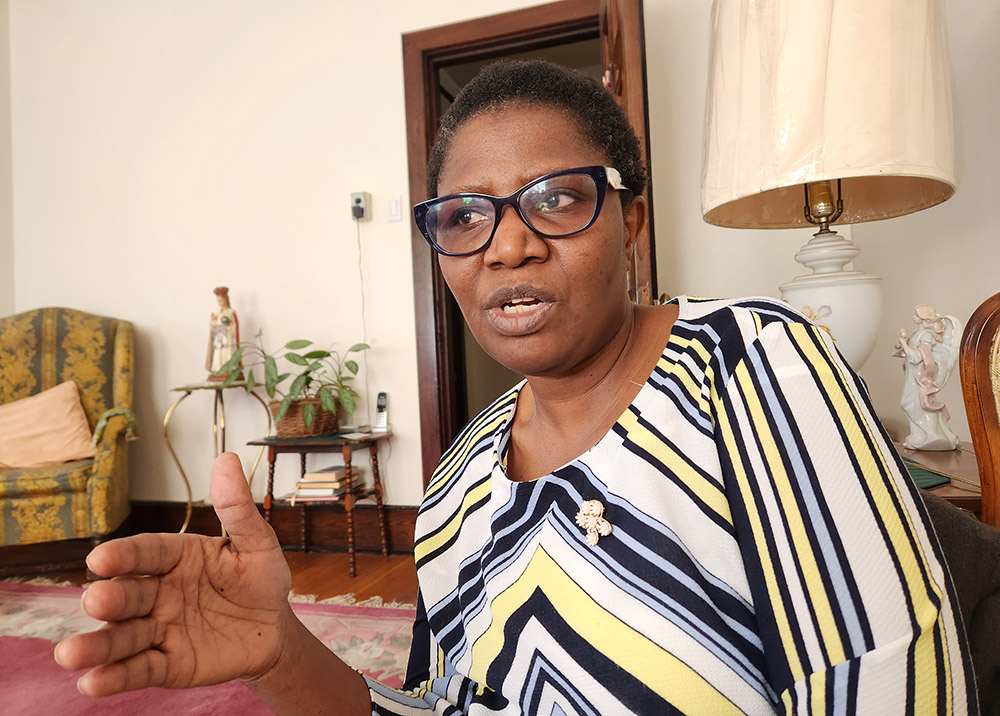
Zambian Sr. Kayula Lesa, a Religious Sister of Charity, said participating in the recent Commission on the Status of Women was inspiring. The commission's theme of trying to bridge the digital divide for women and girls reinforced her experience in Zambia. (GSR photo/Chris Herlinger)
Lesa called the two weeks of meetings, held March 6-17 in and around U.N. headquarters in New York City, a "very busy time" that was energizing.
"I felt very inspired to meet so many women leaders and to learn from them," she said in a March 20 interview with Global Sisters Report in New York.
The meetings have several constituent parts annually, including sessions organized by nongovernmental organizations, such as sister congregations, and events featuring U.N. permanent missions.
In 2020, the event was effectively canceled because of the global COVID-19 pandemic, and in the years since, many events stuck to online forums. This year saw a mixture of the two, with a steady return to more in-person events.
Many of the events focused on the theme of technology while others dealt with equally pressing issues, such as the war in Ukraine.
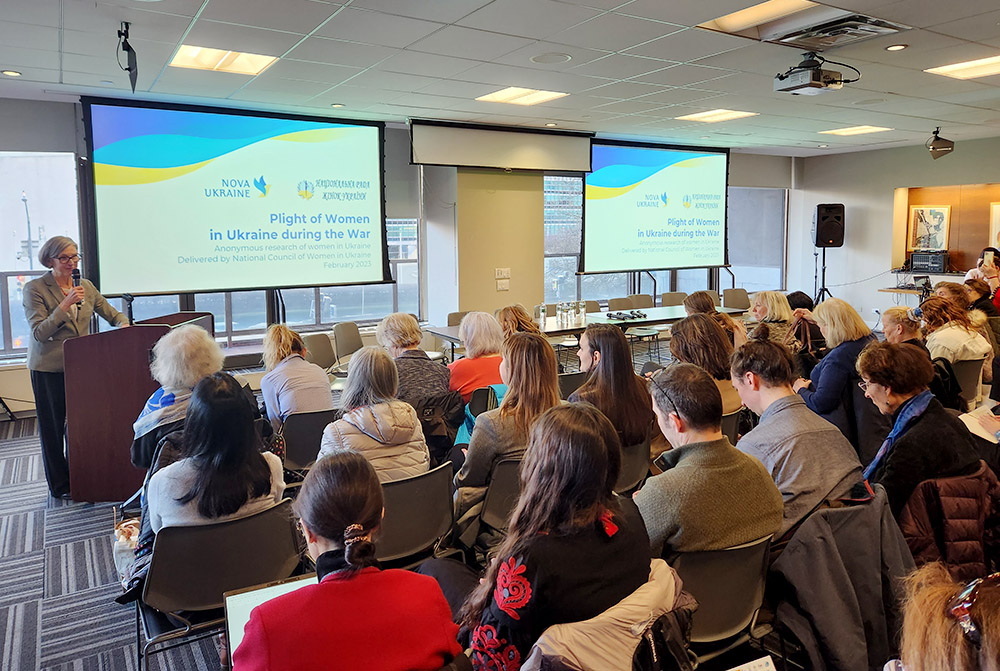
Among the many events during the Commission on the Status of Women was a March 8 event at the Church Center for the United Nations on the challenges facing women in Ukraine. (GSR photo/Chris Herlinger)
The formal sessions of U.N. member states ended with a set of "agreed conclusions" — or consensus — that UN Women, the United Nations' body on gender equality, said in a March 18 statement "provide a blueprint for all stakeholders, including governments, the private sector, civil society and youth to promote the full and equal participation and leadership of women and girls in the design, transformation and integration of digital technologies and innovation processes that fulfill the human rights and needs of women and girls."
In her concluding statement at the end of the commission's meetings, Sima Bahous, the executive director of UN Women, said the consensus is "game-changing" and puts forward "our vision of a more equal and connected world for women and girls in all their diversity."
The agreed conclusions, she said, "bring us a vision of a more equal world. Let us translate them into reality for all women and girls."
In an interview with GSR, Sr. Winifred Doherty, the U.N. representative of the Congregation of Our Lady of Charity of the Good Shepherd and a veteran participant in the women's commission meetings, called the final outcome document "a strong text" and added that she felt the meetings concluded on a strong note.
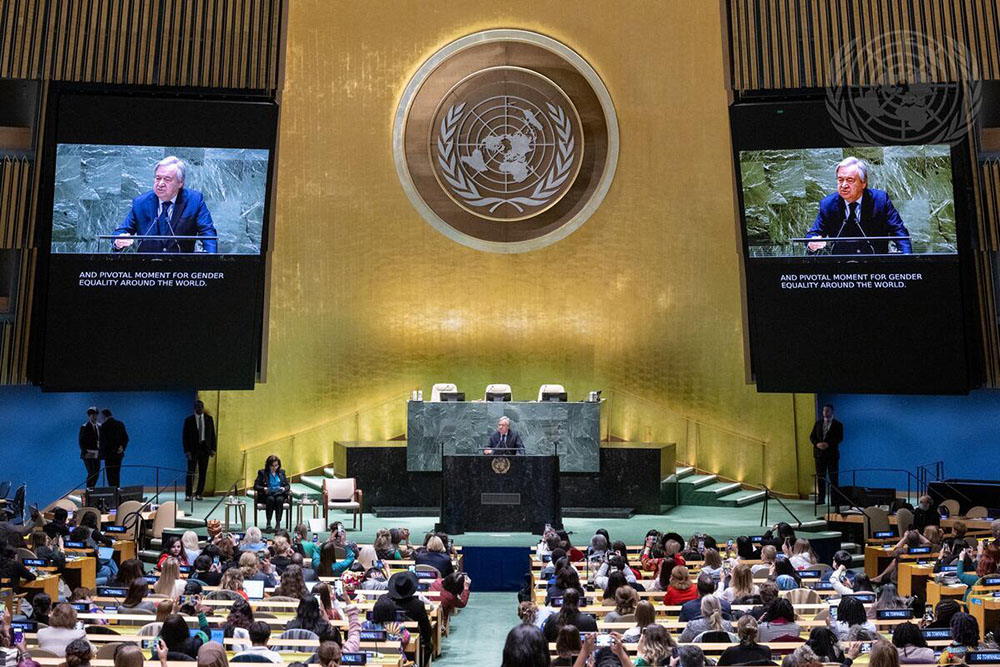
United Nations Secretary-General António Guterres (at podium and on screens) addresses a town hall meeting during the 67th session of the Commission on the Status of Women. (UN photo)
"This was a moment of multilateralism at its best," Doherty said in a March 20 interview.
Doherty said the document, and the U.N. meetings as a whole, acknowledged the need to end the digital divide while noting the ugly underbelly of digital technology: Women bear the brunt of online harassment, and there is a connection between online harassment and gender-based violence.
In a statement issued to the United Nations prior to the opening of the commission, Doherty's congregation said the U.N. must more robustly address the issue of human rights for women and girls in the present global digital-driven context.
"There is no doubt that ongoing innovative and technological developments can be the key to unlock and accelerate gender equality and the upholding of all human rights," the statement said. "However, as the future is being shaped at an alarming speed by innovative and technological developments, the reality is that many of these achievements expose women and girls to further abuse and additional human rights violations."
Advertisement
As one example, the statement noted: "Technology has opened the door to perpetrators through a screen that exposes women, girls, and children to all types of harm, even within the home. Technology has facilitated the rapid global expansion of human trafficking as a criminal industry, which has increased the demand for women and girls as objects of exploitation, prostitution, and violence."
The statement also noted that the lack "of access to technology is a product of the disparity and inequality that women and girls have to endure. In a world where technology is becoming ever more prevalent this lack of access only reinforces discrimination and exploitation and is detrimental to the progress of women and girls."
Those carrying the themes of the commission forward will include Catholic sisters, including a group of Dominicans from four countries who participated in Commission on the Status of Women events and were hosted by Adrian Dominican Sr. Durstyne "Dusty" Farnan, the United Nations' representative for the Dominican Leadership Conference.
In a March 9 interview with the visiting sisters at the Dominican offices near U.N. headquarters, Farnan said it is important for "women to be in all places where decisions are made," which includes the field of technology, where women tend to be underrepresented.
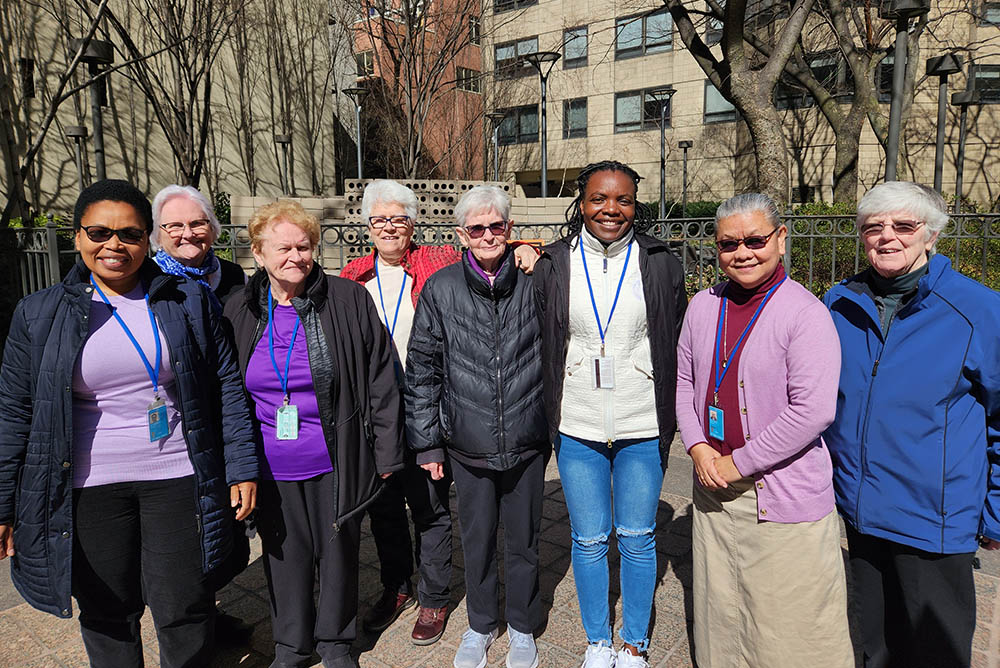
A group of eight Dominican sisters from four countries who participated in Commission on the Status of Women events pose for a photograph near the United Nations in New York City. (GSR photo/Chris Herlinger)
One of the visitors, Adrian Dominican Sr. Bless Colasito, who is originally from the Philippines, spoke of technology's duality when it comes to women, calling it a "make-or-break" dynamic.
"Technology can 'make' a woman when it facilitates the development of the full potential of women — hence becoming self-actualizing individuals," she wrote in a follow-up email to GSR. But, she added, "it can 'break' a woman when technology ushers the culture of death into the life of women — whatever their social, economic, cultural, and religious beliefs."
She added: "Technology has two faces with regards to women's well-being: face of development and the face of abuse."
In several online presentations during the commission meetings, sister participants focused on the positive aspects.
The consensus among participants at a March 13 online event hosted by the Mercy International Association and Mercy Global Action hailed digital engagement as a "key to women's empowerment and feminist leadership." In one example, engaging with digital technology strengthened a Mercy fellowship for emerging female leaders by allowing women from different countries to more easily work together, participants said.
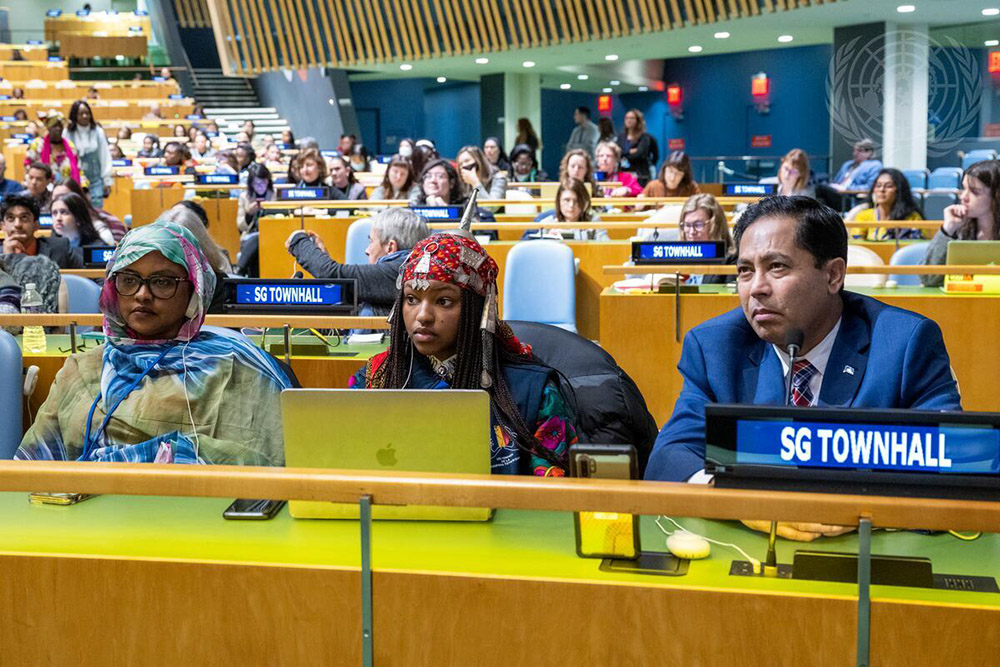
Representatives of civil society groups attend a town hall meeting at the United Nations' Commission on the Status of Women. (UN photo)
Lesa, the Religious Sister of Charity from Zambia, said while there is much work to be done, technological advances have helped her and other sisters in anti-trafficking ministries to network and share useful information and educational materials. (Lesa is the director of Talitha Kum Zambia.)
She said she also believes making digital education more robust for girls can boost their job prospects and help families become more economically secure.
"It's the thinking about social norms that needs to change," she said.
"In our African context," she added, "people's lives change when girls are educated."
The visiting Dominican sisters agreed.
"Educating women and girls is the key to change," said Zimbabwe Sr. Sarudzai Mutero, a member of the Dominican Missionary Sisters of the Sacred Heart of Jesus. "Women who get educated can share that knowledge with others. It's a kind of nurturing."






